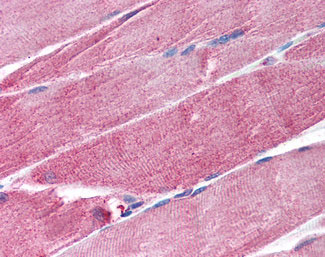MURF1 / IRF Antibody (Internal)
Goat Polyclonal Antibody
- SPECIFICATION
- CITATIONS
- PROTOCOLS
- BACKGROUND

Application
| IHC-P, E |
|---|---|
| Primary Accession | Q969Q1 |
| Reactivity | Human, Monkey |
| Host | Goat |
| Clonality | Polyclonal |
| Calculated MW | 40kDa |
| Dilution | ELISA (1:32000), IHC-P (1.25 µg/ml), |
| Gene ID | 84676 |
|---|---|
| Other Names | E3 ubiquitin-protein ligase TRIM63, 6.3.2.-, Iris RING finger protein, Muscle-specific RING finger protein 1, MuRF-1, MuRF1, RING finger protein 28, Striated muscle RING zinc finger protein, Tripartite motif-containing protein 63, TRIM63, IRF, MURF1, RNF28, SMRZ |
| Target/Specificity | Human TRIM63 / MURF1. |
| Reconstitution & Storage | Store at -20°C. Minimize freezing and thawing. |
| Precautions | MURF1 / IRF Antibody (Internal) is for research use only and not for use in diagnostic or therapeutic procedures. |
| Name | TRIM63 |
|---|---|
| Synonyms | IRF, MURF1, RNF28, SMRZ |
| Function | E3 ubiquitin ligase. Mediates the ubiquitination and subsequent proteasomal degradation of CKM, GMEB1 and HIBADH. Regulates the proteasomal degradation of muscle proteins under amino acid starvation, where muscle protein is catabolized to provide other organs with amino acids. Inhibits de novo skeletal muscle protein synthesis under amino acid starvation. Regulates proteasomal degradation of cardiac troponin I/TNNI3 and probably of other sarcomeric-associated proteins. May play a role in striated muscle atrophy and hypertrophy by regulating an anti-hypertrophic PKC-mediated signaling pathway. May regulate the organization of myofibrils through TTN in muscle cells. |
| Cellular Location | Cytoplasm. Nucleus. Cytoplasm, myofibril, sarcomere, M line. Cytoplasm, myofibril, sarcomere, Z line Note=Colocalizes with TNNI3 in myocytes (By similarity). Localizes to the M- and Z-lines in skeletal muscle. |
| Tissue Location | Muscle specific. Selectively expressed in heart and skeletal muscle. Also expressed in the iris |

Thousands of laboratories across the world have published research that depended on the performance of antibodies from Abcepta to advance their research. Check out links to articles that cite our products in major peer-reviewed journals, organized by research category.
info@abcepta.com, and receive a free "I Love Antibodies" mug.
Provided below are standard protocols that you may find useful for product applications.
Background
E3 ubiquitin ligase. Mediates the ubiquitination and subsequent proteasomal degradation of CKM, GMEB1 and HIBADH. Regulates the proteasomal degradation of muscle proteins under amino acid starvation, where muscle protein is catabolized to provide other organs with amino acids. Inhibits de novo skeletal muscle protein synthesis under amino acid starvation. Regulates proteasomal degradation of cardiac troponin I/TNNI3 and probably of other sarcomeric-associated proteins. May play a role in striated muscle atrophy and hypertrophy by regulating an anti- hypertrophic PKC-mediated signaling pathway. May regulate the organization of myofibrils through TTN in muscle cells.
References
Centner T.,et al.J. Mol. Biol. 306:717-726(2001).
Wistow G.,et al.Mol. Vis. 8:185-195(2002).
Stanchi F.,et al.Submitted (MAR-2000) to the EMBL/GenBank/DDBJ databases.
Dai K.-S.,et al.J. Biol. Chem. 276:23992-23999(2001).
Ota T.,et al.Nat. Genet. 36:40-45(2004).
If you have used an Abcepta product and would like to share how it has performed, please click on the "Submit Review" button and provide the requested information. Our staff will examine and post your review and contact you if needed.
If you have any additional inquiries please email technical services at tech@abcepta.com.













 Foundational characteristics of cancer include proliferation, angiogenesis, migration, evasion of apoptosis, and cellular immortality. Find key markers for these cellular processes and antibodies to detect them.
Foundational characteristics of cancer include proliferation, angiogenesis, migration, evasion of apoptosis, and cellular immortality. Find key markers for these cellular processes and antibodies to detect them. The SUMOplot™ Analysis Program predicts and scores sumoylation sites in your protein. SUMOylation is a post-translational modification involved in various cellular processes, such as nuclear-cytosolic transport, transcriptional regulation, apoptosis, protein stability, response to stress, and progression through the cell cycle.
The SUMOplot™ Analysis Program predicts and scores sumoylation sites in your protein. SUMOylation is a post-translational modification involved in various cellular processes, such as nuclear-cytosolic transport, transcriptional regulation, apoptosis, protein stability, response to stress, and progression through the cell cycle. The Autophagy Receptor Motif Plotter predicts and scores autophagy receptor binding sites in your protein. Identifying proteins connected to this pathway is critical to understanding the role of autophagy in physiological as well as pathological processes such as development, differentiation, neurodegenerative diseases, stress, infection, and cancer.
The Autophagy Receptor Motif Plotter predicts and scores autophagy receptor binding sites in your protein. Identifying proteins connected to this pathway is critical to understanding the role of autophagy in physiological as well as pathological processes such as development, differentiation, neurodegenerative diseases, stress, infection, and cancer.


